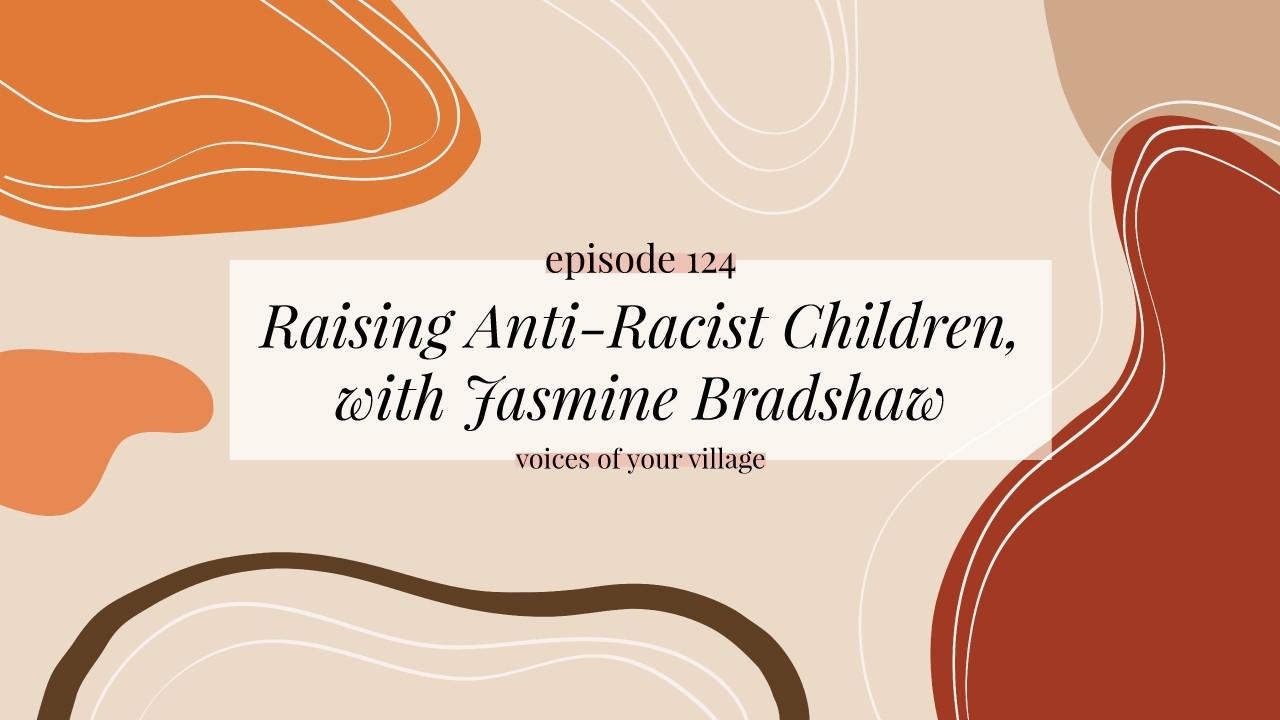Raising Anti-Racist Children, with Jasmine Bradshaw

Welcome back to Voices of Your Village, today in episode 124 we are graced with the presence of Jasmine Bradshaw to discuss raising anti-racist children. Jasmine is the host of the First Name Basis podcast. She is a mama, and she is a beautiful teacher. Jasmine is someone who I have really loved learning from on this journey. Her podcast teaches parents how to talk to children about things like white privilege, anti-racism, and cultural appropriation.
I am really grateful for the resources she provides and that she was willing to share her time to support our village on how to raise anti-racist children. We have a lot of work to do on this journey and I look forward to having you alongside us as we at Seed really work to shift what “business as usual” looks like. We need to make sure we are actively doing this work. Thanks for joining us on this journey in raising emotionally intelligent, actively anti-racist humans so that all children get to grow up in a world where they feel safe, seen, and supported. Alright, let’s dive in!
First, I asked Jasmine to elaborate more on what we mean when we say “anti-racist”. She explained that when you think of anti-racist it is so important to understand that it is an active thing you are doing. “There are these systems within our society that are set up to advantage white people and disadvantage people of color,” Jasmine says. “As someone who is trying to be anti-racist, we have to make sure we are working against those systems, trying to take them apart, reimagine them, and just understand that when we are in our homes and our communities we are using our voices to enact policy change.”
“This is hard when we’re talking about little kids, but we can teach them when they are really tiny about how much their voice matters.”
Jasmine explained that with very little kids we start by making sure that you are affirming differences. This is where we all start. It is talking about differences, I know it’s super tempting to say to kiddos, “We are all the same!” and to look for similarities, which is great. But we also need to be recognizing, naming, and affirming differences in our lives.
“We are helping to let our children know that differences are just a part of life, and even if they cause tension or are uncomfortable, those differences are okay.”
Then, once kids are not as young, we transition to helping them understand these big concepts like racism and sexism in a lens of “What is fair and what is unfair?” This concept of fairness is already one little kids understand. So, when we are helping them see what is going on, whether current or historical events, we can ask them: “What do you think of that? Does it seem fair?” and then we can brainstorm with them how to make it fair, and how it should have gone differently.
“We can’t teach what we don’t know.”
Jasmine then mentioned that one of the things we can do with our really little kiddos is to start by talking about skin tone. We don’t necessarily need to introduce “white and black” to them, because that won’t make sense to them. When you look at someone who is white they are not the color white, and when you look at someone black they are not the color black. So, naturally, this will confuse really little kids who are learning colors. Instead, talk to your kids about skin tone and melanin. Everyone has melanin in their skin, it is just the amount of melanin you have that determines how dark or light you are. And how dark or light you are is determined by where your ancestors are from. If your ancestors are from a climate in which it was really hot, they will have darker skin and vice versa. Introduce this melanin conversation to kiddos as just another vocab word, just as you would teach any new concept.
“If we shy away from this conversation, it’s not that our kid’s questions stop, it’s that they stop asking the questions.”
I then asked Jasmine to explain the history of how we as a society “made up race”. She told me, “When our country was being founded, they wrote in the constitution that ‘all men are created equal’, while engaging in the kidnapping and enslaving of people from Africa.” To this country’s founders, that was cognitive dissonance. How can you say men are created equal but then be traumatizing an entire community of people in this way? Then they found scientists to confirm this bias in themselves. These scientists worked together to distinguish the racial categories into: black, white, yellow, and red. From there, they were able to rank these categories by putting white at the top and determining that all other races were degenerations of the caucasian race. This “science” was then used to confirm the enslavement of people in the United States.
“People don’t fit neatly into these categories, because we made up these categories.”
Thank you, Jasmine, for coming on the podcast and giving folks tangible ways to raise anti-racist children and for breaking this down for all of us. When we think, “How do I teach my 3 year old about systemic racism?” it feels really overwhelming, and thanks to Jasmine we have a place to start the conversation with our tiny humans. For more of the glorious Jasmine Bradshaw, you can find her @FirstName.Basis on Instagram, at FirstNameBasis.org and listen to her podcast at Patreon.org/firstnamebasis.
